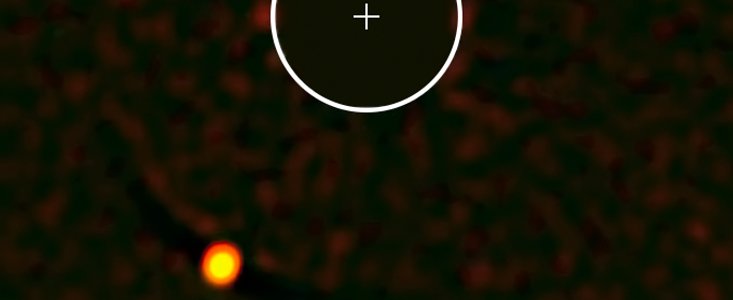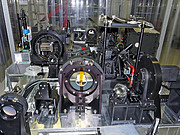Annuncio
SPHERE dell’ESO rivela un esopianeta unico
06 Luglio 2017
Al giorno d’oggi, uno dei settori più stimolanti e appassionanti dell’astronomia è la ricerca di esopianeti, vale a dire altri mondi che orbitano intorno ad altre stelle. Di recente, utilizzando lo strumento SPHERE (Spectro-Polarimetric High-contrast Exoplanet REsearch instrument) installato sul VLT (Very Large Telescope) dell’ESO, è stato scoperto l’esopianeta HIP 65426b. Situato a circa 385 anni luce da noi, HIP 65426b è il primo pianeta trovato da SPHERE [1] e risulta essere anche particolarmente interessante.
Il pianeta è caldo (tra 1000 e 1400 gradi Celsius), con una massa da sei a dodici volte quella di Giove. Sembra avere un’atmosfera molto polverosa, piena di nubi spesse e orbita intorno a una giovane stella molto calda, che ruota in maniera incredibilmente veloce. Curiosamente, vista la sua età, la stella non sembra essere circondata da un disco di detriti e l’assenza di un disco suscita interrogativi inaspettati anzitutto sul modo in cui il pianeta si sia formato. Il pianeta potrebbe essersi formato in un disco di gas e polvere e, quando il disco si è dissipato rapidamente, ha interagito con altri pianeti per poi spostarsi un’orbita più distante, dove lo ritroviamo adesso. Altrimenti, la stella e il pianeta potrebbero essersi formati insieme come un sistema binario in cui il componente più massiccio ha impedito all’altra potenziale stella di accumulare materia a sufficienza per diventare effettivamente una stella. La scoperta del pianeta offre agli astronomi l’opportunità di studiare la composizione e la posizione delle nubi nella sua atmosfera e di verificare le teorie relative alla formazione, evoluzione e fisica degli esopianeti.
SPHERE è un potente cercatore di pianeti installato sull’UT3 del VLT. Il suo scopo scientifico è quello di rilevare e studiare nuovi esopianeti giganti intorno a stelle vicine usando il metodo dell'osservazione diretta [2]. Questo metodo punta a catturare direttamente le immagini degli esopianeti e dei dischi di detriti intorno alle stelle, come se venisse scattata una fotografia. L'osservazione diretta è difficile perché la luce di una stella è talmente potente che la debole luce riflessa dai pianeti in orbita viene sommersa dalla luce della stella. Tuttavia, SPHERE è progettato in modo intelligente per superare tale ostacolo e cercare precisamente la luce polarizzata riflessa dalla superficie di un pianeta.
Questa immagine è stata catturata nell’ambito del programma di una survey chiamata SHINE (SpHere INfrared survey for Exoplanets). SHINE ha lo scopo di rappresentare 600 giovani stelle vicine nel vicino infrarosso, utilizzando l’elevato contrasto e l’alta risoluzione angolare di SPHERE per scoprire e caratterizzare nuovi sistemi planetari ed esplorare il modo in cui si sono formati.
Note
[1] Un precedente comunicato stampa dell’ESO aveva riportato un’osservazione di SPHERE che era stata interpretata come un pianeta. Tuttavia, tale interpretazione è stata messa in dubbio; perciò, HIP 65426b è attualmente la prima rilevazione attendibile di un esopianeta effettuata dallo strumento SPHERE.
[2] Quando perlustrano l’Universo alla ricerca di esopianeti, gli astronomi dispongono di numerosi strumenti. Molti metodi di rilevazione dei pianeti sono indiretti: gli astronomi possono rilevare la diminuzione rivelatrice della luminosità di una stella quando un pianeta vi transita di fronte o misurare la minuscola oscillazione nel moto di una stella, causata dalla spinta gravitazionale di un pianeta orbitante. Tuttavia, esiste un metodo più diretto per scovare un esopianeta: l'osservazione diretta.
Links
- Articolo (in inglese)
Contatti
Gaël Chauvin
Institut de Planetologie et d'Astrophysique de Grenoble (IPAG)
BP 53, 38041 Grenoble Cedex 9, France
Tel: +33 6 4551 8209
Email: gael.chauvin@univ-grenoble-alpes.fr
Jean-Luc Beuzit
Institut de Planetologie et d'Astrophysique de Grenoble (IPAG)
BP 53, 38041 Grenoble Cedex 9, France
Tel: +33 6 8739 6285
Email: jean-luc.beuzit@univ-grenoble-alpes.fr
Richard Hook
ESO Public Information Officer
Garching bei München, Germany
Tel: +49 89 3200 6655
Cell: +49 151 1537 3591
Email: rhook@eso.org
Riguardo all'annuncio
| Identificazione: | ann17041 |
Our use of Cookies
We use cookies that are essential for accessing our websites and using our services. We also use cookies to analyse, measure and improve our websites’ performance, to enable content sharing via social media and to display media content hosted on third-party platforms.
ESO Cookies Policy
The European Organisation for Astronomical Research in the Southern Hemisphere (ESO) is the pre-eminent intergovernmental science and technology organisation in astronomy. It carries out an ambitious programme focused on the design, construction and operation of powerful ground-based observing facilities for astronomy.
This Cookies Policy is intended to provide clarity by outlining the cookies used on the ESO public websites, their functions, the options you have for controlling them, and the ways you can contact us for additional details.
What are cookies?
Cookies are small pieces of data stored on your device by websites you visit. They serve various purposes, such as remembering login credentials and preferences and enhance your browsing experience.
Categories of cookies we use
Essential cookies (always active): These cookies are strictly necessary for the proper functioning of our website. Without these cookies, the website cannot operate correctly, and certain services, such as logging in or accessing secure areas, may not be available; because they are essential for the website’s operation, they cannot be disabled.
Functional Cookies: These cookies enhance your browsing experience by enabling additional features and personalization, such as remembering your preferences and settings. While not strictly necessary for the website to function, they improve usability and convenience; these cookies are only placed if you provide your consent.
Analytics cookies: These cookies collect information about how visitors interact with our website, such as which pages are visited most often and how users navigate the site. This data helps us improve website performance, optimize content, and enhance the user experience; these cookies are only placed if you provide your consent. We use the following analytics cookies.
Matomo Cookies:
This website uses Matomo (formerly Piwik), an open source software which enables the statistical analysis of website visits. Matomo uses cookies (text files) which are saved on your computer and which allow us to analyze how you use our website. The website user information generated by the cookies will only be saved on the servers of our IT Department. We use this information to analyze www.eso.org visits and to prepare reports on website activities. These data will not be disclosed to third parties.
On behalf of ESO, Matomo will use this information for the purpose of evaluating your use of the website, compiling reports on website activity and providing other services relating to website activity and internet usage.
Matomo cookies settings:
Additional Third-party cookies on ESO websites: some of our pages display content from external providers, e.g. YouTube.
Such third-party services are outside of ESO control and may, at any time, change their terms of service, use of cookies, etc.
YouTube: Some videos on the ESO website are embedded from ESO’s official YouTube channel. We have enabled YouTube’s privacy-enhanced mode, meaning that no cookies are set unless the user actively clicks on the video to play it. Additionally, in this mode, YouTube does not store any personally identifiable cookie data for embedded video playbacks. For more details, please refer to YouTube’s embedding videos information page.
Cookies can also be classified based on the following elements.
Regarding the domain, there are:
- First-party cookies, set by the website you are currently visiting. They are stored by the same domain that you are browsing and are used to enhance your experience on that site;
- Third-party cookies, set by a domain other than the one you are currently visiting.
As for their duration, cookies can be:
- Browser-session cookies, which are deleted when the user closes the browser;
- Stored cookies, which stay on the user's device for a predetermined period of time.
How to manage cookies
Cookie settings: You can modify your cookie choices for the ESO webpages at any time by clicking on the link Cookie settings at the bottom of any page.
In your browser: If you wish to delete cookies or instruct your browser to delete or block cookies by default, please visit the help pages of your browser:
Please be aware that if you delete or decline cookies, certain functionalities of our website may be not be available and your browsing experience may be affected.
You can set most browsers to prevent any cookies being placed on your device, but you may then have to manually adjust some preferences every time you visit a site/page. And some services and functionalities may not work properly at all (e.g. profile logging-in, shop check out).
Updates to the ESO Cookies Policy
The ESO Cookies Policy may be subject to future updates, which will be made available on this page.
Additional information
For any queries related to cookies, please contact: pdprATesoDOTorg.
As ESO public webpages are managed by our Department of Communication, your questions will be dealt with the support of the said Department.


